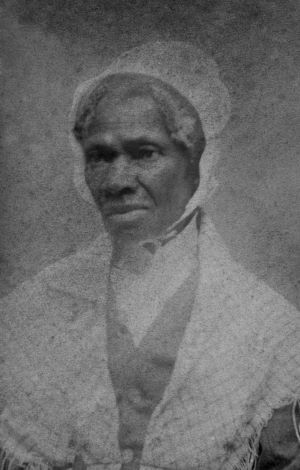Sojourner Truth, mistranslated

I first learned about this from other translators as an example of what not to do. As in, oh my god, why would anyone even think about doing this?
As you probably know, in 1851, Sojourner Truth gave a speech to the Women’s Convention in Akron, Ohio. She had been born into slavery, but after she got her freedom, she became a tireless abolitionist. The speech became well known in 1863 (twelve years later) in a version published by Frances Dana Barker Gage and known as “Ain’t I a Woman?”
Here’s the problem: Sojourner Truth, born Isabella Baumfree in New York, grew up speaking Dutch, and learned English with an upper New York State low-Dutch accent. A earlier account of her speech was published in 1951 by Sojourner Truth’s friend, Rev. Marius Robinson, and she approved of his transcription. It’s fairly correct English, which other observers said was how she spoke.
The later version, by Gage, reconstructs her words with a stereotypical southern slave dialect. It’s a powerful speech, but not what she sounded like at all: “Well, chillen, whar dar’s so much racket dar must be som’ting out o’kilter.”
You can learn more about the two versions and what they mean to the understanding of American history at the Sojourner Truth Project.
As translators, we know there are many kinds and dialects of English, and they’re all valid, each with its own nuance and significance, which must be understood and respected. Gage certainly meant well, since she was also active for women’s rights and abolition, but her version of the speech was “a gross misrepresentation of Sojourner Truth’s words and identity,” as the Sojourner Truth Project puts it.
I’m a member of the American Translators Association, and its Code of Ethics calls on us “to convey meaning between people, organizations, and cultures accurately, appropriately, and without bias.” Gage mistranslated Sojourner Truth’s words from one kind of English into another kind of English. Perhaps she thought the speech would be more effective if it sounded more like what White people at the time apparently assumed all Black people sounded like.
Yes, all Black people sound alike (please note my sarcasm). Black culture and Black speech, then and now, is instead rich and complex. Translation can be tricky and often requires research, but some choices are obviously inaccurate, inappropriate, and biased — that is, unethical.
The trade paperback edition of my novel Dual Memory comes out on April 16 and is available for pre-order from your favorite bookseller. Hardcover, ebook, and audiobook editions are also available.
The third book in the Semiosis trilogy, Usurpation, will be published in October this year, and you can pre-order it with links to your favorite bookseller here, in hardcover and ebook.



